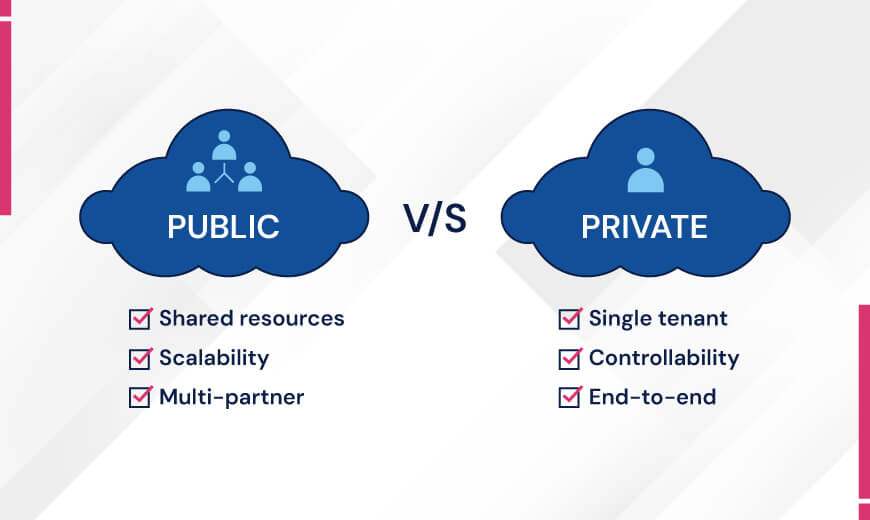Choosing the best cloud deployment model from public and private cloud computing solutions can be a pivotal decision for any organisation. Each cloud model offers unique advantages and features. Exploring the comprehensive comparison between the public cloud and private cloud can empower businesses to make informed choices, aligning with their requirements and goals.
This comprehensive comparison blog namely, public cloud vs private cloud, will give you the idea of choosing the best cloud model for your business.
Decide between Public and Private Cloud solutions based on scalability, security, and cost-effectiveness.
A] What Is a Private Cloud?
A private cloud is a dedicated cloud computing model that serves a single user or organisation. It offers robust security, flexibility, and a reliable environment for hosting sensitive and private data on the cloud. Private cloud has other names like internal or corporate cloud due to its private and isolated nature. A private cloud is usually installed within the premises of an organisation. However, Businesses can rent private cloud infrastructure from a reputed service provider without investing in expensive resources.
It uses virtualisation technology to pool resources and deliver them as needed to ensure optimal utilisation and flexibility. In addition, the private cloud uses VPN-based internet or private ethernet connection to mitigate any data breaches.
B] What Is a Public Cloud?
The provision of cloud computing over the public internet is known as the public cloud. It is a cost-effective way to host data on the cloud with a high level of flexibility on resources. The public cloud resources may be offered to the users free of cost or subscription-based. However, it lags in delivering optimal security protocols and is considered less reliable than the other cloud deployment models. This model is more open to vulnerability as it uses the public internet and shared resources.
C] Explore The Difference Between Public Cloud And Private Cloud
1. Infrastructure
The private cloud offers a robust and dedicated infrastructure for hosting an organisation’s data on the cloud. The infrastructure is solely provisioned to a business. The secure infrastructure ensures safe application delivery and reliable data protection. However, on-premises private cloud may lag in replicating the current cloud technologies while rented private cloud offers the same features with updated technologies and infrastructure.
The public cloud also offers shared infrastructure to host multiple user’s data on the cloud. It is renowned for its updated infrastructure without spending a single penny over the management and maintenance. The user can leverage the public cloud’s robust infrastructure either free of cost or on-demand subscription.
2. Data Storage Environment
The private cloud offers dedicated resources to store data on the cloud. The dedicated resources ensure the safety of data and offer enhanced performance without any data breaches. In the private cloud deployment model, user data is stored either on an on-premises or on a third party’s data centre.
In the public cloud deployment model, the user data is stored in the third–party data centre beyond the reach of the user. Data is stored in a multi-tenant environment where storage resources are shared among multiple customers. The service provider is solely responsible for the user’s data safety and management.
3. Hardware & Services
Private Cloud offers dedicated and tailored hardware configuration as per the organisation’s requirement. The dedicated hardware ensures optimal security and performance. The customised services and support by the rented cloud computing solution provider aid in optimising the hardware and services for specific workloads and performance needs.
Public cloud provision shared hardware including computer power, storage, database, and more among multiple users. The hardware resources are made available to public users either free or paid. However, shared resources of the public cloud provide an open ground for cyberpunks.
4. Scalability & Reliability
The private cloud offers high scalability with customisable infrastructure. It provides highly flexible infrastructure in case of meeting the need of fluctuating demands. Businesses can leverage the on-demand resources by contacting their service provider or deploying additional hardware configuration. A private cloud is a highly secured and reliable cloud computing solution for those businesses that deal with sensitive data.
The public cloud offers high scalability, enabling users to scale their resource needs to meet demands. However, it lacks reliability due to the shared resources across multiple users and is open to the public.
5. Security
The private cloud is renowned for its excellent security protocols due to its single-tenant nature and robust compliance measures. It offers customised security configurations and tighter access controls to safeguard sensitive information. However, organisations with on-premises private clouds are responsible for their cloud security while the service provider manages rented private cloud security.
Public clouds are more vulnerable to security threats due to their multi-tenancy nature. As user data is stored in the service provider’s data centre, it poses the risk of data duplicity and theft.
6. Examples
Example of private clouds includes VMware Cloud on AWS, Microsoft Azure Stack, OpenStack, and Dell EMC Cloud for Microsoft Azure Stack.
When comparing public cloud vs private cloud examples, public cloud providers include Amazon Web Services (AWS), Microsoft Azure, Google Cloud Platform (GCP), and IBM Cloud.
D] Public Vs Private Cloud: Choosing The Best For Your Business
Public and private cloud, both offers robust infrastructure for cloud computing needs. However, data security and performance can be prime factors to consider while deciding between public and private clouds. Businesses with sensitive databases should opt for private cloud deployment models while businesses with limited budgets and low-user bases may opt for public cloud deployment models. On the other hand, rented private cloud offers a cost-effective model for those searching for a secured cloud environment without investing in expensive hardware configurations. In addition, choosing a good cloud provider also plays a critical role in providing optimal security, scalability, and performance.
Decide between Public and Private Cloud solutions based on scalability, security, and cost-effectiveness.
Conclusion
Private and public cloud are renowned for their robust infrastructure and high scalability. The public cloud offers a cost-effective way of cloud computing while the private cloud provides an extended range of security protocols and performance. Choosing the best for your business depends on the requirements and goals.
Absolute Cloud is a leading and renowned provider of dedicated servers in India that offers cost-effective and highly secured solutions to all your dedicated cloud computing needs without any headache of maintenance and management. Any doubts? Contact us today!

Mr. Sachit Saraf
Director of Absolute Cloud and a second-generation leader in cloud computing, Sachit excels at merging technology with business acumen. With expertise in data analytics, business intelligence, and cloud solutions, he is committed to providing secure, 24/7 online access to critical software. Sachit’s passion lies in leveraging analytics for data-driven decisions, optimising processes, and driving transformative growth in the tech industry.


